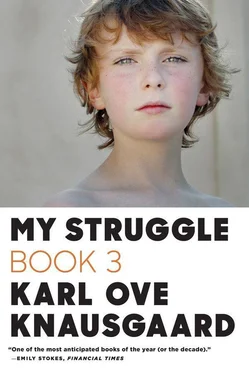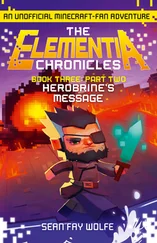“Is it for me?” I said. “All of it?”
“Yes,” she said.
“What about Yngve?”
“No, not this time. He’s been allowed to see the match. You have to have a treat as well!”
“Thank you very much,” I said, tearing off the cardboard packaging to reveal the bar wrapped in silver paper.
“But don’t say anything to Yngve, OK?” she said with a wink. “It’s our secret.”
I munched the chocolate as she sat doing a crossword.
“We’re getting a telephone soon,” I said.
“Are you?” she said. “Then we can talk to each other.”
“Yes,” I said. “We’re actually at the end of the waiting list, but we’re getting it anyway because Dad’s in politics.”
She laughed.
“In politics, Karl Ove?” she said.
“Yes,” I said. “He is, isn’t he?”
“Yes, he is. He is indeed.”
“Are you enjoying school?” she said.
I nodded.
“Yes, very much.”
“What do you like best?”
“The breaks,” I said, knowing that would make her laugh, or at least smile.
When I had finished the chocolate and she was immersed in the crossword again, I went up to the loft and brought down some of the games.
After a while she looked at me and asked me if we shouldn’t go to the match as well. I wanted to go. We got dressed, she took her bike from the garage, I sat on the luggage rack, she sat on the saddle but kept one foot on the ground and turned to me.
“Ready?” she said.
“Yes,” I said.
“Hold on tight, here we go!”
I wrapped my arms around her. She pushed off with her foot, put it on the pedal, and freewheeled down the little hill, turned right, and started pedaling.
“Are you OK?” she asked, and I nodded until I realized she couldn’t see me, and said, “Yes, I’m fine.”
And I was. It felt good holding her, and cycling with her was fun. Grandma was the only person who touched Yngve and me, the only person who gave us hugs and stroked our arms. She was also the only person who played with us. Dad might do it at Christmas, but we always did the things he wanted to do, like playing Mastermind or chess or Chinese checkers or Yahtzee or crazy eights or poker with matchsticks. Mom joined in when we played, but we did most things with her, either on the kitchen table at home or at the arts and crafts workshop in Kokkeplassen, and it was fun, but not like with Grandma, who didn’t mind doing what we were doing and followed with interest when Yngve showed her something from his chemistry set, for example, or helped me when I was doing a jigsaw puzzle.
The wheels went more and more slowly until they almost stopped completely and Grandma got off and pushed the bike to the crest of the hill.
“You just stay where you are, if you want,” she said.
I sat gazing over the town while Grandma pushed the bike, a trifle out of breath. Reaching the top, she got back on the saddle and it was a gentle downhill ride all the way to the stadium. A sudden huge groan erupted, as if from an enormous animal, and then there was clapping. Few sounds were so irresistible. Grandma cycled down to one end of the stadium, rested the bike against the wooden fence, and let me stand on the luggage rack for a few minutes while she held me so that I could see what was happening on the field. The players were a long way away, all the details eluded me, apart from the yellow-and-white shirts against the green of the turf and all the spectators standing around the field, a black surging mass, but I caught the mood, I inhaled it and in the days to come I would savor it in my mind.
Back home, she began to prepare the meal we would have before leaving, and not long afterward the door in the hall opened, it was Grandad, his expression was grim, and when Grandma saw it she said, “So they lost?”
He nodded, sat down on his chair, and she poured him some coffee. I never quite understood what the power relationship was between Grandma and Grandad. On the one hand, she always served him food, cooked all the meals, did all the washing up and the housework, as though she were his servant; on the other hand, she was often angry or irritated with him, and then she gave him a mouthful or made a fool of him, she was sharp and not infrequently sarcastic, while he said very little, preferring not to respond. Was it because he didn’t need to? Because nothing of what she said altered anything important? Or because he couldn’t? If Yngve and I were present during such sparring, Grandma would wink at us, as if to say this wasn’t serious, or use us in her sally against him by saying such things as “Grandad can’t even change a lightbulb properly,” while Grandad, for his part, would look at us, smile, and shake his head at Grandma’s antics. I never saw any form of intimacy between them, other than in their verbal exchanges or the closeness that was evident when she served him.
“They lost, I heard?” she said again when Mom, Dad, and Yngve came up the stairs ten minutes later.
“Yes, they did. Eternally owned is but what’s lost,” Dad quoted. “Or what do you reckon, Dad?”
Grandad growled something or other.
When we left in the evening we were given a bag of plums, a bag of pears, and a bag of bread rolls. Grandad, reluctant to leave his chair, said goodbye to us upstairs while Grandma came down with us, gave us each a long hug, stood on the front doorstep, and waved until she could no longer see us.
Strangely enough, the journey back always seemed much faster than the journey there. I loved traveling in a car at night, with the dashboard lit, the muted voices from the front seats, the gleam of street lamps as we passed beneath, washing over us like breakers or waves of light, the long, completely dark stretches that cropped up intermittently, where all you saw, all that existed, was the tarmac lit up by the headlights and the countryside they illuminated on the bends. Sudden treetops, sudden crags, sudden sea inlets. It was always a particular pleasure to arrive at the house in the night as well, to hear footsteps on the gravel and the sharp slam of car doors and the rattle of keys, to see the light in the hall come on, revealing the presence of all the familiar objects. The shoes with the grommets as eyes and the tongue as a forehead, the chilly gaze from the white two-holed electric sockets above the baseboard, the hat stand in the corner, with its back turned. And in my room: the pens and pencils assembled like a gang of schoolchildren in the pen stand, some insolently leaning against the edge, ready at any moment to discharge a gobbet of spit to prove they were not interested in anyone or anything. The duvet and the pillow that were either tidy and puffed up, looking like something that shouldn’t be touched, a coffin or a capsule in a spaceship, or else were molded in the shape of my last movements, happy to be rearranged, but with no real inclination in that direction. The fixed stare of the lamps. The mouth of the keyhole, the two screw eyes of the metal fitting, the long, oddly positioned nose of the handle.
I brushed my teeth, shouted goodnight to Mom and Dad, and got into bed to read for half an hour. I had two favorite books, which I tried to quarantine long enough to be able to read them again in the same way I had the first time, but it never worked, I picked them up again much too soon. One was Doctor Dolittle, which was about a doctor who could talk to animals and one day went on a long voyage with them, to Africa, where, after being hunted and captured by some Hottentots, he finally found what he was looking for, the rare sausage animal that had two heads, one at each end. The second book was Gangles, which was about a girl who would stand on fountains of water and allow herself to be hurled into the air, and who, after several misadventures, ended up balancing above the sea on a spout of water blown out by an enormous whale. Tonight, however, I chose another book from the pile, The Little Witch, which was about a witch who was too small to join the coven in Bloksberg, but who snuck in anyway. She did lots of things she wasn’t supposed to do, like witchcraft on Sundays, which was almost unbearable to read about, she shouldn’t have done it, she would be caught … and indeed she was, but everything turned out fine in the end. I read a few pages, but as I knew the story so well I looked at the pictures instead. After flicking through it, I turned off the light, rested my head on the pillow, and closed my eyes.
Читать дальше












